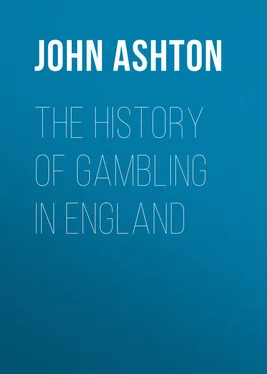John Ashton - The History of Gambling in England
Здесь есть возможность читать онлайн «John Ashton - The History of Gambling in England» — ознакомительный отрывок электронной книги совершенно бесплатно, а после прочтения отрывка купить полную версию. В некоторых случаях можно слушать аудио, скачать через торрент в формате fb2 и присутствует краткое содержание. Жанр: foreign_antique, foreign_prose, на английском языке. Описание произведения, (предисловие) а так же отзывы посетителей доступны на портале библиотеки ЛибКат.
- Название:The History of Gambling in England
- Автор:
- Жанр:
- Год:неизвестен
- ISBN:нет данных
- Рейтинг книги:5 / 5. Голосов: 1
-
Избранное:Добавить в избранное
- Отзывы:
-
Ваша оценка:
- 100
- 1
- 2
- 3
- 4
- 5
The History of Gambling in England: краткое содержание, описание и аннотация
Предлагаем к чтению аннотацию, описание, краткое содержание или предисловие (зависит от того, что написал сам автор книги «The History of Gambling in England»). Если вы не нашли необходимую информацию о книге — напишите в комментариях, мы постараемся отыскать её.
The History of Gambling in England — читать онлайн ознакомительный отрывок
Ниже представлен текст книги, разбитый по страницам. Система сохранения места последней прочитанной страницы, позволяет с удобством читать онлайн бесплатно книгу «The History of Gambling in England», без необходимости каждый раз заново искать на чём Вы остановились. Поставьте закладку, и сможете в любой момент перейти на страницу, на которой закончили чтение.
Интервал:
Закладка:
In early English times we get occasional glimpses of gambling with dice. Ordericus Vitalis (1075-1143) tells us that “the clergymen and bishops are fond of dice-playing” – and John of Salisbury (1110-1182) calls it “the damnable art of dice-playing.” In 1190 a curious edict was promulgated, which shows how generally gambling prevailed even among the lower classes at that period. This edict was established for the regulation of the Christian army under the command of Richard the First of England and Philip of France during the Crusade. It prohibits any person in the army, beneath the degree of knight, from playing at any sort of game for money: knights and clergymen might play for money, but none of them were permitted to lose more than twenty shillings in one whole day and night, under a penalty of one hundred shillings, to be paid to the archbishops in the army. The two monarchs had the privilege of playing for what they pleased, but their attendants were restricted to the sum of twenty shillings, and, if they exceeded, they were to be whipped naked through the army for three days. The decrees established by the Council held at Worcester in the twenty-fourth year of Henry III. prohibited the clergy from playing at dice or chess , but neither the one nor the other of these games are mentioned in the succeeding statutes before the twelfth year of Richard II., when diceing is particularised and expressly forbidden.
The letter books of the Corporation of the City of London, during the thirteenth and fourteenth centuries, give us several examples of diceing. “4 Ed. II., a. d. 1311. Elmer de Multone was attached, for that he was indicted in the Ward of Chepe for being a common night walker; and, in the day, is wont to entice strangers and persons unknown, to a tavern, and there deceive them by using false dice. And, also, for that he was indicted in Tower Ward, for being a bruiser and night walker, against the peace; as, also, for being a common rorere . 5 5 Riotous person.
And, also, for that he was indicted in the Ward of Crepelgate for playing at dice, and for that he is wont to entice men into a tavern, and to make them play at dice there against their will. He appeared, and, being asked how he would acquit himself thereof, he said that he was not guilty, and put himself upon the country as to the same. And the jury came, by Adam Trugge and others, on the panel; and they said, upon their oath, that he is guilty of all the trespasses aforesaid. Therefore he was committed to prison,” &c.
The next is from a Proclamation made for the safe keeping of the City. 8 Ed., III. a. d. 1334. “Also, we do forbid, on the same pain of imprisonment, that any man shall go about, at this Feast of Christmas, with companions disguised with false faces, 6 6 Masks.
or in any other manner, to the houses of the good folks of the City, for playing at dice there; but let each one keep himself quiet and at his ease within his own house.”
“50 Ed. III., a. d. 1376. Nicholas Prestone, tailor, and John Outlawe, were attached to make answer to John atte Hille, and William, his brother, in a plea of deceit and falsehood; for that the same John Outlawe, at divers times between the Feast of Our Lord’s Nativity, in the 49th year, &c., and the First Sunday in Lent, then next ensuing, came to the said John atte Hille and William, and asked if they wished to gain some money at tables or at chequers, commonly called ‘ quek ’; to which they said ‘Yes’; whereupon the same John Outlawe said they must follow him, and he would show them the place, and a man there, from whom they could easily win; and further said that he would be partner with them, to win or to lose.
“And they followed him to the house of the said Nicholas in Friday Street, and there they found the said Nicholas with a pair of tables, on the outside of which was painted a chequer board, that is called a ‘ quek .’ And the said Nicholas asked them if they would play at tables for money; whereupon the said complainants, knowing of no deceit, or ill-intent, being urged and encouraged thereto by the same John Outlawe, played with him at tables and lost a sum of money, owing to false dice.
“And the said John then left them to play alone; and, after that, they still continued to lose. The said tables were then turned, and the complainants played with the defendant Nicholas at ‘ quek ’ until they had lost at the games of tables and quek 39s. 2d. After which the complainants, wondering at their continued losing, examined the board at which they had been playing and found it to be false and deceptive; seeing that in three quarters of the board all the black points were so depressed that all the white points in the same quarters were higher than the black points in the same; and, on the fourth quarter of the board, all the white points were so depressed that all the black points in that quarter were higher than the white. They inspected and examined also the dice with which they had first played at tables, and found them to be false and defective. And, because they would play no longer, the said Nicholas and John Outlawe stripped John atte Hille of of a cloak, 16 shillings in value, which they still retained.”
They were found guilty and sentenced to return the money lost and the cloak, or its value, and “Afterwards, on the prosecution of Ralph Strode, Common Serjeant of the said City, by another jury, they were found guilty of the fraud and deception so imputed to them. Therefore it was awarded that they should have the punishment of the pillory, to stand thereon for one hour in the day, and that the said false chequer board should be burnt beneath them, the Sheriff causing the reason for their punishment to be proclaimed. And, after that, they were to be taken back to the Prison of Newgate, there to remain until the Mayor and Aldermen should give orders for their release.”
And so dicing went on, unimpaired in popularity, in spite of legal fulminations, until Elizabeth’s time, when we probably hear more of it, owing to the greater dissemination of literature in that reign. In 1551 there was a famous murder, in which Mr Arden of Feversham was killed whilst playing a game of tables with one Mosbie, the paramour of his wife, who had made Mosbie a present of a pair of silver dice to reconcile a disagreement that had subsisted between them. Shakespeare mentions dice and dicing thirteen times in seven plays, and in Jonson, and the early dramatists, there are many allusions to this species of gambling.
In the British Museum is a little MS. book 7 7 Harl. MSS., 6395.
called “New Passages and Jests,” which were collected by Sir Nicholas L’Estrange of Hunstanton, Bart., who died in 1669, and in one of the anecdotes we get an insight into cheating at dice. “Sir William Herbert, playing at dice with another gentleman, there arose some questions about a cast. Sir William’s antagonist declared it was a four and a five; he as positively insisted that it was a five and a six: the other then swore with a bitter imprecation that it was as he said. Sir William then replied, ‘Thou art a perjured knave; for, give me a sixpence, and if there be a four upon the dice, I will return you a thousand pounds’; at which the other was presently abashed, for, indeed, the dice were false, and of a high cut , without a four.”
Charles Cotton, in his Compleat Gamester , gives us a vivid account of dicing, as it then was, at an ordinary, after dark.
“The day being shut in, you may properly compare this place to those Countries which lye far in the North, where it is as clear at midnight as at noonday… This is the time (when ravenous beasts usually seek their prey) when in comes shoals of Huffs , Hectors , Setters , Gilts , Pads , Biters , Divers , Lifters , Filers , Budgies , Droppers , Crossbyters , &c., and these may all pass under the general and common appellation of Rooks … Some of these Rooks will be very importunate to borrow money of you without any intention to pay you; or to go with you seven to twelve, half a crown, or more, whereby, without a very great chance (ten to one, or more), he is sure to win. If you are sensible hereof, and refuse his proposition, they will take it so ill, that, if you have not an especiall care, they will pick your pocket, nim your gold or silver buttons off your Cloak or Coat, or, it may be, draw your silver-hilted sword out of your belt, without discovery, especially if you are eager upon your Cast, which is done thus: the silver buttons are strung, or run upon Cats guts fastened at the upper and nether ends; now, by ripping both ends very ingeniously, give it the gentle pull, and so rub off with the buttons; and, if your Cloak be loose, ‘tis ten to one they have it.
Читать дальшеИнтервал:
Закладка:
Похожие книги на «The History of Gambling in England»
Представляем Вашему вниманию похожие книги на «The History of Gambling in England» списком для выбора. Мы отобрали схожую по названию и смыслу литературу в надежде предоставить читателям больше вариантов отыскать новые, интересные, ещё непрочитанные произведения.
Обсуждение, отзывы о книге «The History of Gambling in England» и просто собственные мнения читателей. Оставьте ваши комментарии, напишите, что Вы думаете о произведении, его смысле или главных героях. Укажите что конкретно понравилось, а что нет, и почему Вы так считаете.












